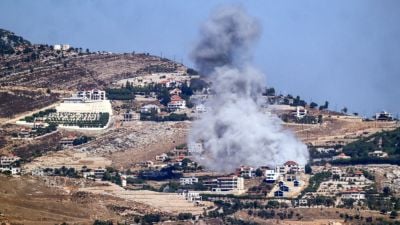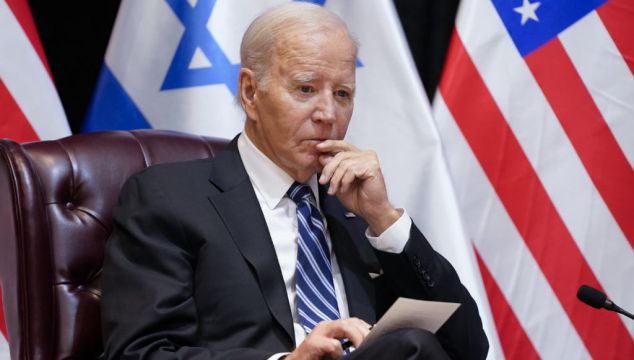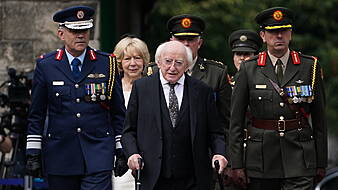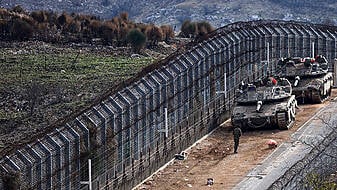As Israel pounded northern Gaza with air strikes last October and ordered the evacuation of more than a million Palestinians from the area, a senior Pentagon official delivered a blunt warning to the White House.
The mass evacuation would be a humanitarian disaster and could violate international law, leading to war crime charges against Israel, Dana Stroul, then the deputy assistant secretary of defence for the Middle East, wrote in an October 13th email to senior aides to US president Joe Biden. Stroul was relaying an assessment by the International Committee of the Red Cross that had left her “chilled to the bone,” she wrote.
As the Gaza war nears its first anniversary and the Middle East teeters on the brink of a wider war, Stroul’s email and other previously unreported communications show the Biden administration’s struggle to balance internal concerns over rising deaths in Gaza with its public support for Jerusalem following the Hamas attack on southern Israel on October 7th that killed 1,200 people.
Reuters reviewed three sets of email exchanges between senior US administration officials, dated October 11th to 14th, just days into the crisis. The fighting has led to more than 40,000 deaths in Gaza and spurred US protests led by Arab-Americans and Muslim activists.
The emails, which haven’t been reported before, reveal alarm early on in the State Department and Pentagon that a rising death toll in Gaza could violate international law and jeopardise US ties in the Arab world. The messages also show internal pressure in the Biden administration to shift its messaging from showing solidarity with Israel to including sympathy for Palestinians and the need to allow more humanitarian aid into Gaza.
A ceasefire deal remains elusive, despite months of US-brokered negotiations. Much of Gaza is now a wasteland. And the risk of a regional war with Iran looms after Israel’s attacks on military targets in Lebanon and last week’s assassination of Iranian-backed Hezbollah militia leader Hassan Nasrallah.
Top Biden administration officials say they believe White House pressure on Israeli prime minister Benjamin Netanyahu’s government in those early days made a difference, preventing an even worse disaster. In private talks, the White House asked Israel to delay its ground offensive to give more time for aid groups to prepare help for displaced people and to give Israel more time to strike a deal with Hamas, administration officials told reporters in background briefings at the time.
But Washington was slow to address the suffering of Palestinians, said three senior US officials involved in the decision-making process. And while the ground invasion was ultimately delayed by about 10 days, the three officials attributed the pause more to operational preparations by the Israeli military than US pressure.

After publication of this story, Democratic Senator Chris Van Hollen said the emails show that "unfolding humanitarian disaster in Gaza was painfully clear from the earliest days of the war, with key experts warning that international standards were being violated" and that "valid concerns" were overridden by the White House.
In response to questions about the emails, the White House said, "The US has been leading international efforts to get humanitarian aid into Gaza” and “this is and will continue to be a top priority.” It added that before US “engagement, there was no food, water, or medicine getting into Gaza.”
Both Israeli and Hamas leaders are being investigated for alleged war crimes in the wake of the Hamas attacks. In June, a UN commission concluded there was credible evidence that Hamas and other armed Palestinian groups committed war crimes including torture and taking hostages. The commission also found evidence of Israeli war crimes from the country’s use of massive explosives in Gaza in the first months of the war.
The Biden administration and vice president Kamala Harris’ presidential campaign remain caught between two powerful constituencies – pro-Israel Democrats and younger, pro-Palestinian progressives. Harris’ Republican rival, former president Donald Trump, says he would “settle” the war “fast” if he wins November’s presidential election, without detailing how. But foreign policy analysts say the election is unlikely to alter US policy toward Israel significantly, given both parties’ long support for the country.
The emails reviewed by Reuters show a scramble inside the Biden administration to warn the White House of the impending crisis – and the White House’s initial resistance to a ceasefire in the early, chaotic days of war. The three sets of email exchanges began on October 11th, during Israel’s fifth day of air strikes after the Hamas incursion.
'Losing credibility'
Early on, concerns grew inside the administration about America’s image with its Arab allies.
After Israeli airstrikes hit Gaza’s hospitals, schools and mosques, the US State Department’s top public diplomacy official, Bill Russo, told senior State officials that Washington was “losing credibility among Arabic-speaking audiences” by not directly addressing the humanitarian crisis, according to an October 11th email. Gaza’s health authorities reported that day a death toll of about 1,200.
As Israel defended the strikes, saying Hamas was using civilian buildings for military purposes, Russo wrote that US diplomats in the Middle East were monitoring Arab media reports that accused Israel of waging a “genocide” and Washington of complicity in war crimes.
“The US’s lack of response on the humanitarian conditions for Palestinians is not only ineffective and counterproductive, but we are also being accused of being complicit to potential war crimes by remaining silent on Israel’s actions against civilians,” Russo wrote.
At the time, emergency workers were struggling to save people buried under rubble from Israel airstrikes and the world’s sympathies were beginning to shift from murdered Israelis to besieged Palestinian civilians.
Addressing State Department leaders, Russo urged quick action to shift the administration’s public stance of unqualified support for Israel and its military operation in Gaza. “If this course is not quickly reversed by not only messaging, but action, it risks damaging our stance in the region for years to come,” he wrote. Russo resigned in March, citing personal reasons. He declined to comment.

The State Department’s top Middle East diplomat, Barbara Leaf, forwarded Russo’s email to White House officials including Brett McGurk, Biden’s top adviser for Middle East affairs. She warned that the relationship with Washington’s “otherwise would-be stalwart” Arab partners was at risk due to the kinds of concerns raised by Russo.
McGurk replied that if the question was whether the administration should call for a ceasefire, the answer was “No.” He added, however, that Washington was “100 per cent” in favour of supporting humanitarian corridors and protecting civilians. McGurk and Leaf declined to comment for this story.
Following Russo’s email, the public US stance remained largely unchanged for the next two days, a review of public comments shows. US officials continued to emphasise Israel’s right to defend itself and plans to provide Jerusalem with military aid.
'Pump the breaks'
On October 13th, two days after Russo’s email, Israeli aircraft dropped leaflets over northern Gaza, warning one million residents to leave their homes. Netanyahu gave residents 24 hours to flee as Israeli troops backed by tanks began a ground assault inside the Hamas-run territory of 2.3 million people. He vowed to annihilate Hamas for its attack.
The evacuation order alarmed aid agencies and the United Nations. By then, Israel’s air strikes had razed entire districts. The International Committee of the Red Cross (ICRC) in Geneva issued a statement saying Israel's order was "not compatible with international humanitarian law" because it would cut off food, water and other basic needs in Gaza. Privately, in a phone conversation that day with Stroul, ICRC Middle East director Fabrizio Carboni was more pointed, the emails show.
"ICRC is not ready to say this in public, but is raising private alarm that Israel is close to committing war crimes," Stroul said in her October 13th email, describing the conversation. Her email was addressed to senior White House officials including McGurk, along with senior State and Pentagon officials. “Their main line is that it is impossible for one million civilians to move this fast,” Stroul wrote. One US official on the email chain said it would be impossible to carry out such an evacuation without creating a “humanitarian catastrophe.”

Asked about Carboni’s phone call with Stroul, the ICRC said it “constantly works with parties to armed conflicts and those who have influence with them to increase the respect for the laws of war in order to prevent civilian suffering in conflict. We consider such conversations to be strictly confidential.”
Publicly, the White House was expressing measured support for Israel’s plans. A White House spokesperson told reporters that such a huge evacuation was a "tall order" but that Washington would not second-guess Israel. US Defence Secretary Lloyd Austin said US military aid would continue flowing to Israel.
Privately, some senior US officials were concerned there was no safe way out of densely populated Gaza, several senior US officials told Reuters. Israel had imposed a blockade. Its southern neighbour, Egypt, would not open its borders as part of its long-standing policy to prevent a mass resettlement of Palestinians. Some Palestinians who fled northern Gaza were killed when Israel bombed cars and trucks.
In an email replying to Stroul, McGurk said Washington might be able to persuade Israel to extend the deadline for Palestinians to evacuate beyond 24 hours, saying the administration “can buy some time.” But the Red Cross, the UN and aid agencies should work with Egypt and Israel to prepare for the evacuation, he wrote.
McGurk, a long-time Iraq expert, likened the situation to the US-led military operation against Islamic State militants in Mosul from 2016 to 2017, an assault that left the Iraqi city in ruins. He said the military and humanitarian strategy in the Mosul assault had been planned hand in hand. Two officials on the email chain replied that it would be impossible to put in place the necessary infrastructure with so little time. One reminded McGurk that the Mosul operation was the result of much longer planning. Humanitarian groups had months to set up and provide support for displaced civilians.
“Our assessment is that there’s simply no way to have this scale of a displacement without creating a humanitarian catastrophe,” Paula Tufro, a senior White House official in charge of humanitarian response, wrote in the email. It would take “months” to get structures in place to provide “basic services” to more than a million people. She asked that the White House tell Israel to slow its offensive.
“We need GOI (Government of Israel) to pump the brakes in pushing people south,” Tufro wrote.
Andrew Miller, then the deputy assistant secretary at the State Department’s Bureau of Near Eastern Affairs, urged his colleagues to act fast.
“If we’re inclined to weigh in with the Israelis to dissuade them from seeking mass evacuations, we will have to do it soon, at a high level and at multiple touch points,” Miller wrote. He resigned in June, citing family reasons.
Biden’s public comments on Gaza had largely given Netanyahu a free hand against Hamas. At the time, Biden faced only scattered protests from the left wing of the Democratic Party over his support for Israel's counterattack. Israel's likening of the Hamas assault to the September 11th, 2001, attacks on New York and Washington resonated widely in the US.
The administration’s public stance began to change on October 13th. At a news conference in Doha, US Secretary of State Antony Blinken for the first time publicly recognised the “suffering of Palestinian families in Gaza.” Washington was in constant talks with the Israelis and aid groups to help civilians in Gaza, he said.
The next day, October 14th, Biden’s rhetoric shifted. He said in a speech that he was urgently prioritising the humanitarian crisis in Gaza and directed his team to help surge relief into the war zone. It is unclear if the emails by Russo and others influenced the statements from Blinken and Biden.
Although Israel began sending infantry into Gaza on October 13th, a large-scale ground invasion didn’t begin until October 27th. Sources familiar with the matter said at the time that Washington advised Israel to hold off, mainly to give time for diplomacy to free Israeli hostages held by Hamas.
From the early days of the conflict, the US stressed that Israel has a right to defend itself but that how it does so matters, a State Department spokesperson said in response to questions for this story. “Israel has a moral imperative to mitigate the harm of its operations to civilians, something we have emphasised both publicly and privately,” the spokesperson said.
Stroul and Tuffro declined to comment. In a statement, Miller said the administration was “concerned about the humanitarian implications of a mass evacuation.” He added that “Israeli military plans were very inchoate at that stage and we were trying to develop a better understanding” of Israel’s “strategy and objectives.”
Weapons expedited
As US officials assessed the humanitarian crisis, Israel pressed Washington for more arms.
On October 14th, a senior Israeli Embassy official in Washington urged the State Department to accelerate shipment of 20,000 automatic rifles for the Israeli National Police, according to the emails.
Israeli senior defence advisor Ori Katzav apologised in an October 14th email to his State Department counterpart for disturbing her on the weekend but said the rifle shipment was “very urgent” and needed US approval. Christine Minarich – an official at the State Department division that approves arms sales, the Directorate of Defence Trade Controls – told Katzav the rifles would not be approved in the next 24 to 48 hours. Such large weapons shipments can take time, requiring State Department approval and notification to Congress.
Katzav and the Israeli Embassy declined to comment.
Jessica Lewis, then the assistant US secretary for political and military affairs, forwarded Minarich’s email and Israel’s request for the rifles to the State Department’s Democracy, Labor and Human Rights (DRL) bureau. DRL reviews potential US weapon sales to ensure they aren’t sent to militaries involved in rights abuses.
Lewis asked the bureau to expedite its review and “urgently” explain any opposition to specific arms packages for Israel, according to the emails. Lewis resigned in July.
Christopher Le Mon, deputy assistant secretary at DRL, recommended denying more than a dozen arms packages, including grenade launchers, gun parts, rifles and spare rifle parts. In a reply to Lewis, he cited concerns about the “conduct” of specific Israeli National Police units, including the elite Yamam border patrol unit.
Le Mon wrote that there were “numerous reports” of Yamam’s involvement in “gross violations of human rights.” DRL raised objections against 16 separate arms packages for Israel, according to the email and a source familiar with the matter. Nearly all the shipments went ahead despite the bureau’s objections, the source said. Yamam’s missions eventually included a June 8th rescue of four Israeli hostages that Gaza health officials say killed more than 200 Palestinians.
Minarich, Le Mon, Lewis and the Israeli Embassy declined to comment.

Washington has sent to Israel large numbers of munitions since the Gaza war began, according to several US officials with knowledge of the matter, including thousands of precision-guided missiles and 2,000-pound bombs that can devastate densely populated areas and have been used to collapse tunnels and bunkers.
Some rights groups blame the use of those weapons for civilian deaths. Amnesty International cited at least three incidents from October 10th to January 2024 involving US-supplied weapons that it said killed civilians, including women and children, in “serious violations” of international humanitarian law. In July, it warned of US complicity in what it said was Israel’s unlawful use of US weapons to commit war crimes – an accusation the US has rejected.
A State Department report in May said Israel may be violating international law using U.S. weapons, but said it could not say so definitively due to the chaos of war and challenges in collecting data.
An Israeli Embassy spokesperson rejected accusations that Israel has targeted civilians. “Israel is a democracy that adheres to international law,” the spokesperson said.







